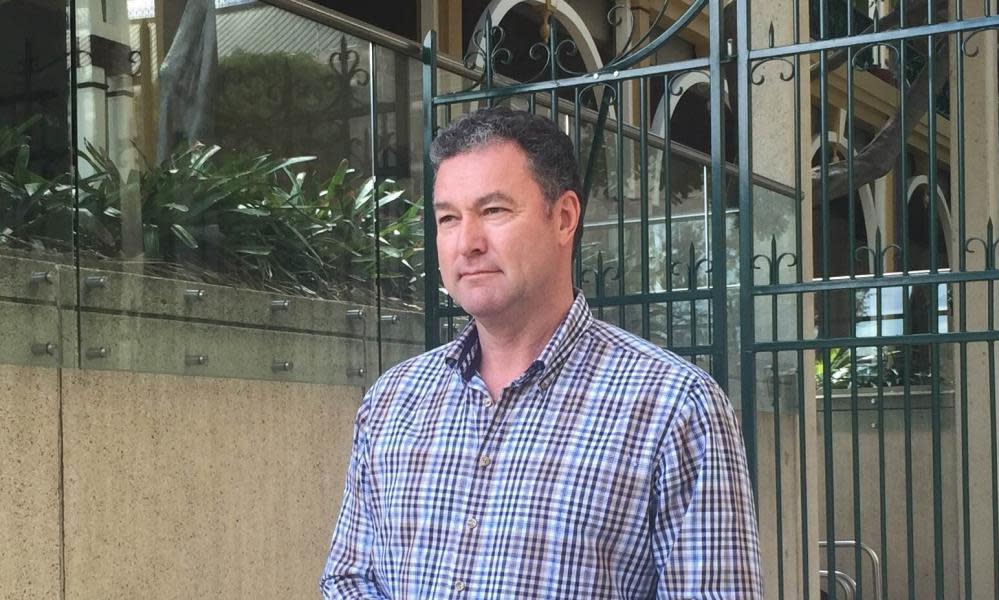Queensland LNP frontbencher tells new citizens not to bring problems to Australia

The Queensland Liberal National party’s shadow minister for multicultural affairs told a cohort of newly-affirmed Australian citizens they needed to assimilate, and warned those from war-torn countries “please don’t bring those problems here”.
Attendees at the Gold Coast citizenship ceremony on Thursday told Guardian Australia they were left stunned by the remarks of the former LNP leader and current frontbencher John-Paul Langbroek.
Multicultural community leaders expressed concerns the statements could have unfairly linked some new citizens to acts of violence, at a time when there are concerns about growing racist sentiment.
Langbroek, a childhood immigrant to Australia from the Netherlands, told about 25 people taking their citizenship affirmation: “It’s a day of mixed emotions about what you have left behind and we don’t expect you to leave it completely behind.
“But what we do ask is, and the mayor often says this, is that we treat each other with harmony, respect and courtesy.
“If you do come from some of those countries where they’ve had difficulties or battles, please don’t bring those problems here.
“Because in Australia we pride ourselves on our assimilation, the fact that you can maintain your own culture but that we value our own Gold Coast and Queensland community.”
Related: 'Queensland first': Palaszczuk closes the borders and amps up election rhetoric
The Queensland multicultural affairs minister, Stirling Hinchliffe, said the citizenship ceremony comments were “either clumsy language or deliberate”.
“John-Paul Langbroek should apologise or join One Nation,” Hinchliffe said.
Peter Forday, the co-chair of the Cohesive Communities Coalition, which this week launched a call for stronger action to prevent vilification and hate crimes, said Langbroek’s comments were made days after the alleged murder of a young African man at Zillmere in Brisbane.
“In my past albeit limited contact with the shadow minister, I have appreciated his balanced and considered responses to what we have had to discuss at those times.
“I assume in this instance Mr Langbroek is referring to the tragic death of a young man in north Brisbane. I have no doubt that like all Queenslanders, no matter how long they have lived here, Mr Langbroek is dismayed about this awful event. I know that I am and the communities directly involved, even more so.
“I am also concerned that perhaps inadvertently Mr Langbroek has left some of our newest citizens feeling unfairly branded with an act of violence with which they had nothing to do, and which they also abhor.
Related: Naming Brisbane women risks 'a second wave of Covid-related racial hostility’: commission
“Although this may have not been intended, Mr Langbroek’s comments may have taken some of the gloss off their big day, and if that is their experience, I am sad about that.
“I would be happy to draw something positive about this terrible tragedy situation by meeting with the shadow minister to talk about the aspiration of all Queenslanders to feel safe and welcomed, and the work we are doing in this space to improve the effectiveness of our laws.”
The Human Rights Commission has said it was aware of racist abuse hurled at members of Brisbane’s African community recently, following media reports naming and shaming two women who allegedly contracted coronavirus in Melbourne, then made false declarations to re-enter Queensland.
“We’ve heard of lots of incidents happening over the years [but] since Covid, there has been more fear in the community, and we’ve seen the Asian community targeted initially and more recently the African community,” the human rights commissioner Scott McDougall told the ABC this week.
The Guardian went to the state opposition seeking comment from Langbroek. The opposition leader’s office referred the Guardian to a statement about the Zillmere incident on Monday, which said Labor’s “soft on crime” approach was failing to protect the community.


